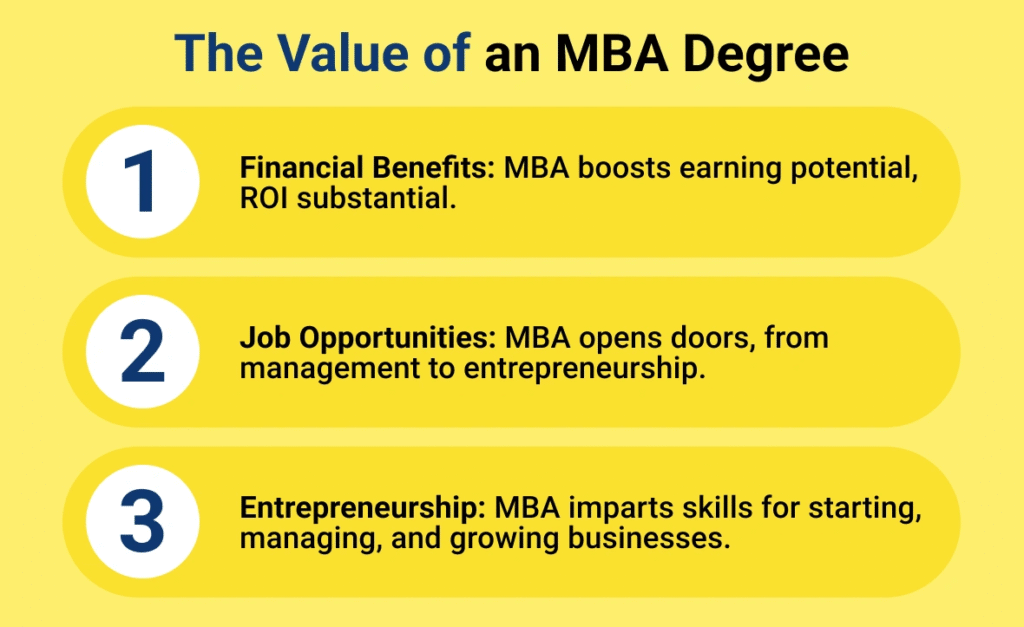In an age dominated by rapid digital transformation, online certifications, and startup culture, the value of traditional higher education is under scrutiny. Among the most debated degrees is the Master of Business Administration (MBA). Once considered the golden ticket to career advancement, the MBA is now questioned more than ever: Is an MBA program worth it anymore?
This article explores the modern relevance of MBA programs, balancing perspectives from professionals, employers, and educators. We’ll look into costs, returns, evolving job markets, and alternatives—so you can make an informed decision before committing time and money.
Key Takeaways
- An MBA still holds value, especially for those seeking leadership roles, career changes, or access to elite networks.
- The cost vs. ROI is a critical consideration; MBAs from top-tier schools tend to provide better returns.
- Online MBAs are a practical, more affordable alternative, especially for working professionals.
- In today’s dynamic economy, skills, experience, and adaptability often outweigh credentials.
- Evaluate your goals clearly before choosing between an MBA or alternative pathways.
What Is an MBA Program?

An MBA (Master of Business Administration) is a postgraduate degree focusing on business, management, leadership, finance, and entrepreneurship. Traditional MBA programs usually span one to two years, but there are flexible options like:
- Full-time MBA
- Part-time MBA
- Executive MBA (EMBA)
- Online/Hybrid MBA
Students come from various academic backgrounds, and many use the MBA to pivot into new industries, accelerate their careers, or launch ventures.
Why Was an MBA Considered Valuable?
| Reason | Explanation |
|---|---|
| Career Acceleration | Opens doors to senior roles and promotions faster, especially in large firms. |
| Skill Development | Provides in-depth knowledge in finance, strategy, marketing, leadership, etc. |
| Networking | Connects students with peers, faculty, alumni, and recruiters from top firms. |
| Global Exposure | Offers international programs, diverse student cohorts, and global case studies. |
| Prestige & Branding | Degrees from top B-schools carry weight and elevate personal brand value. |
| Career Switching | Enables transitions into new fields such as consulting, finance, or tech. |
| Entrepreneurship | Equips students with frameworks and contacts to start or grow a business. |
Historically, the MBA served several vital purposes:
1. Career Acceleration
Top MBA programs have strong alumni networks and brand equity that open doors to managerial roles and high-paying jobs.
2. Skill Acquisition
MBA programs equip students with core skills in finance, marketing, operations, HR, and strategic management.
3. Networking
Peer-to-peer networking, internships, and alumni communities add immense value beyond classroom learning.
4. Global Exposure
Many MBAs offer international exchange programs and diverse cohorts, which expand cultural and global perspectives.
Why the Value of an MBA Is Being Questioned

Several factors have led to growing skepticism about the worth of an MBA:
1. High Cost vs. ROI
Top MBA programs can cost $100,000–$200,000, including tuition and living expenses. For many, the return on investment (ROI) is no longer as compelling, especially with slow salary growth in some industries.
2. Alternative Education Options
Online platforms like Coursera, Udemy, and LinkedIn Learning offer affordable, specialized courses. Bootcamps and certifications like Google’s Project Management or CFA/CPA are also in demand.
3. Startup & Tech Culture
In the tech world, skills often matter more than degrees. Founders and tech leads don’t always prioritize MBAs when hiring.
4. Market Saturation
With more people earning MBAs, the degree no longer guarantees exclusivity or elite status, especially if not from a top-tier institution.
When an MBA Still Makes Sense
While an MBA may not be essential for everyone, it can still provide exceptional value under the right conditions:
Career Change or Pivot
If you want to switch industries—say from engineering to finance or marketing—an MBA can ease the transition.
Leadership Aspirations
For professionals targeting C-level or senior management roles, the strategic thinking and business acumen developed in MBA programs are valuable.
Networking Access
Top schools like Harvard, Wharton, and INSEAD offer access to influential networks that can open job, investment, and mentorship doors.
International Mobility
An MBA from a global institution can help candidates access visa sponsorships or job opportunities abroad.
Is an Online MBA a Good Alternative?

Absolutely. Online MBA programs have evolved significantly:
Pros of Online MBA
- Lower cost and flexible schedules
- Same curriculum and faculty as on-campus programs
- Accessible for working professionals
Cons
- Limited face-to-face networking
- May lack the “brand power” of traditional top-tier MBAs (though this is changing)
Some reputable online MBA programs include those from Carnegie Mellon, University of Illinois, and Indiana University (Kelley).
Real-World Data: Is the ROI Still There?
Let’s look at some current stats:
- Average MBA salary (U.S.): $115,000–$150,000/year depending on industry and school
- Average tuition: $60,000–$160,000
- Break-even time: 3–6 years (shorter if you attend a top-tier school and land a consulting or tech job)
MBA ROI is highest in:
- Management consulting (e.g., McKinsey, BCG, Bain)
- Investment banking/private equity
- Tech product management (e.g., Google, Amazon)
ROI is lower in:
- Nonprofits
- Entrepreneurship (high risk)
- Early-stage startups
Top MBA Alternatives to Consider
If you’re unsure about pursuing a traditional MBA, consider these alternatives:
Specialized Master’s Programs
- Master’s in Finance (MFin)
- Master’s in Data Science or Business Analytics
Certifications
- Project Management (PMP)
- CFA, CPA, Six Sigma
- Product Management certifications
Entrepreneurship Bootcamps
- Y Combinator Startup School
- Techstars
- Founder Institute
Also Read :- What Can You Do with an MBA Degree?
Conclusion
So, is an MBA program worth it anymore? The answer depends on your goals, finances, and the stage of your career. For some, it’s a game-changing opportunity. For others, it’s an expensive detour.
MBA programs are evolving to stay relevant—offering online formats, flexible timelines, and specialized paths. But with a multitude of accessible, affordable learning alternatives today, the MBA is now just one of many routes to career success, not the only one.
FAQs
1. Can I get a good job without an MBA?
Yes. Many companies prioritize skills, experience, and results over degrees. Fields like tech, marketing, and product management often hire non-MBAs.
2. What is the best age to do an MBA?
Typically, people pursue an MBA between 24–35 years. Executive MBAs are common for professionals aged 35+.
3. Does MBA increase salary significantly?
It depends. Graduates from top 20 programs often see a 50–100% salary increase, especially in finance and consulting.
4. Are online MBA degrees respected by employers?
Yes—especially if from accredited, well-known universities. Reputation and AACSB accreditation matter.
5. Can I do an MBA without a business background?
Absolutely. Many MBA students come from engineering, science, law, medicine, and humanities.
6. How do I choose the right MBA program?
Consider:
- Accreditation
- Cost vs. ROI
- Specializations
- Alumni network
- Format (online, part-time, executive)
7. Is MBA still valuable in 2025 and beyond?
Yes—for specific goals like leadership, career switching, or networking. But it’s no longer the one-size-fits-all solution it once was.




